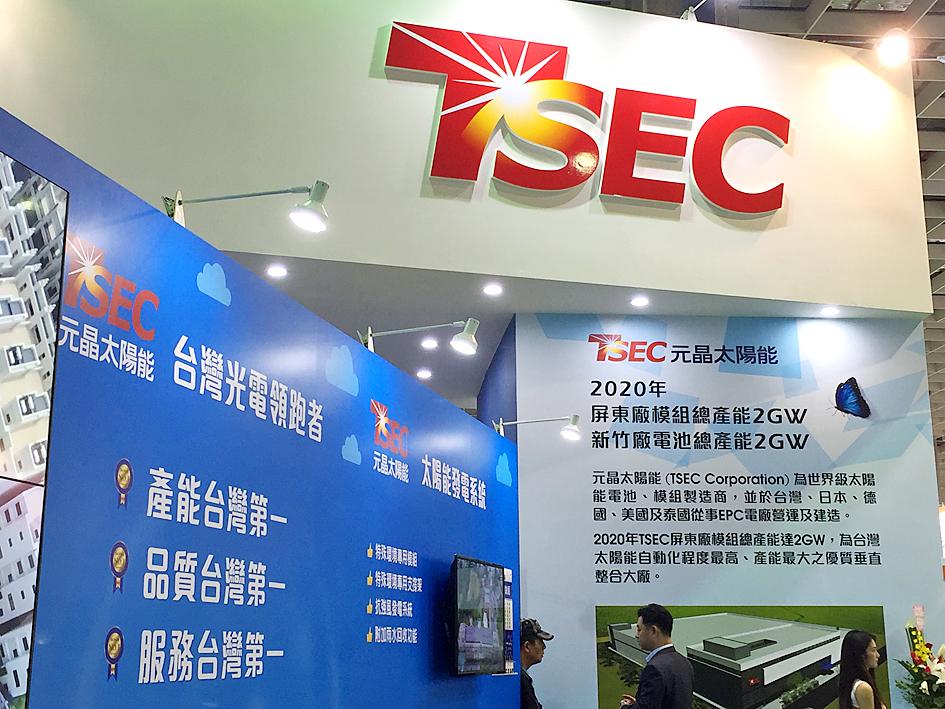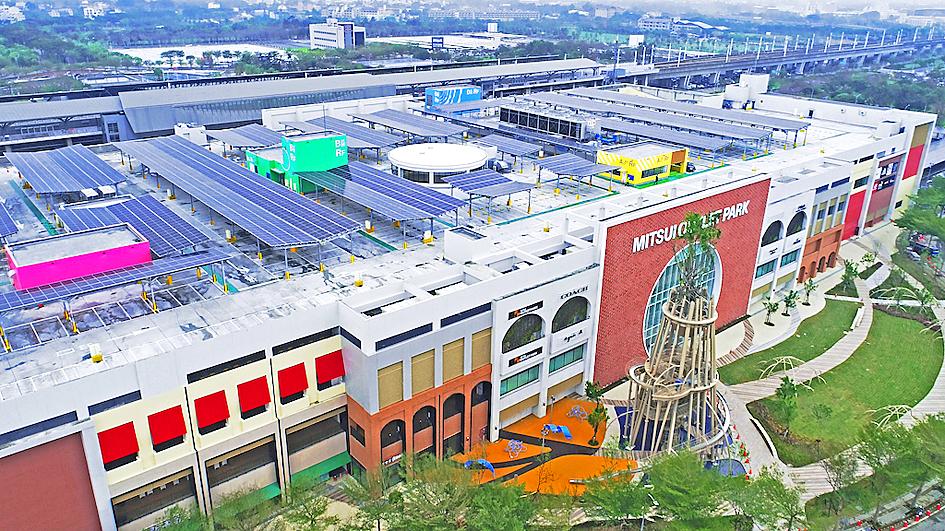Solar cell and module supplier TSEC Corp (元晶太陽能) has pledged NT$1.4 billion (US$50 million) to install new production lines at its plants in Hsinchu and Pingtung counties after the InvesTaiwan Service Center approved its application to participate in the government program, the Ministry of Economic Affairs said on Friday.
It was the company’s second application that was approved since it in December 2020 invested NT$700 million to set up large-scale solar cell and high-efficiency solar module production in Hsinchu’s Hukou Industrial Park (湖口工業區).
The new investment comes as demand from home and overseas markets for solar cells and modules has continued to grow due to many governments’ efforts to generate more energy from renewable sources and achieve carbon neutrality.

Photo: Chang Huei-wen, Taipei Times
“As carbon neutrality is a trend in international energy policy, demand for green energy is growing explosively and it is expected to have a promising outlook for the photovoltaic [PV] market in the long term,” the ministry said in a statement.
TSEC is planning to build a second production line for solar cells at its plant in the Hukou Industrial Park, as well as construct a fourth production line and a new warehouse building at its solar module plant in Pingtung’s Daching Industrial Park (大慶工業區), the ministry said.
“The new investment is estimated to increase the company’s annual production capacity by 400 megawatts [MW] to 1,300MW and help the government achieve net zero carbon emissions by 2050,” the ministry said.

Photo courtesy of New Green Power Co
Separately, New Green Power Co (永鑫能源), a PV systems company, said it has again cooperated with Mitsui Fudosan Co, to build rooftop solar systems at the Japanese real-estate developer’s new shopping mall in Tainan, following an earlier project in Taichung.
The new Mitsui Outlet Park in Tainan’s Gueiren District (歸仁) has an installed capacity of 2.3MW and would generate about 4 million kilowatt-hours (kWh) of energy per year, enough to supply 1,100 households, the Taipei-based solar company wrote on LinkedIn.
“The Mitsui Outlet Park Tainan is the third outlet park built by Mitsui Fudosan, and it is their second project combining a shopping mall and a solar power plant after the Mitsui Outlet Park Taichung,” New Green Power said on Saturday, one day after the new shopping mall’s formal opening.
New Green Power acted as the engineering, procurement and construction company for the Tainan project, providing end-to-end solar energy services, including designing the solar systems, giving procurement details and installing the panels.
The Tainan project includes PV panels installed on the main roof of the shopping mall, as well as in the mall’s parking lots, the company said.
Construction started in December last year and the panels are expected to be connected to the grid next month, the company said.
The project is designed to reduce annual carbon emissions by an estimated 2,100 tonnes, equivalent to 118,000 trees planted or five times the amount that Taipei’s Daan Forest Park (大安森林公園) can absorb in a year, it added.
New Green Power first cooperated with the Japanese developer to built rooftop and parking lot PV panels in the Mitsui Outlet Park at the Port of Taichung, which opened in March 2019.
The Taichung project has an installed capacity of 4.6MW and reduces annual carbon emissions by 3,349 tonnes, it said.

In Italy’s storied gold-making hubs, jewelers are reworking their designs to trim gold content as they race to blunt the effect of record prices and appeal to shoppers watching their budgets. Gold prices hit a record high on Thursday, surging near US$5,600 an ounce, more than double a year ago as geopolitical concerns and jitters over trade pushed investors toward the safe-haven asset. The rally is putting undue pressure on small artisans as they face mounting demands from customers, including international brands, to produce cheaper items, from signature pieces to wedding rings, according to interviews with four independent jewelers in Italy’s main

Macronix International Co (旺宏), the world’s biggest NOR flash memory supplier, yesterday said it would spend NT$22 billion (US$699.1 million) on capacity expansion this year to increase its production of mid-to-low-density memory chips as the world’s major memorychip suppliers are phasing out the market. The company said its planned capital expenditures are about 11 times higher than the NT$1.8 billion it spent on new facilities and equipment last year. A majority of this year’s outlay would be allocated to step up capacity of multi-level cell (MLC) NAND flash memory chips, which are used in embedded multimedia cards (eMMC), a managed

Japanese Prime Minister Sanae Takaichi has talked up the benefits of a weaker yen in a campaign speech, adopting a tone at odds with her finance ministry, which has refused to rule out any options to counter excessive foreign exchange volatility. Takaichi later softened her stance, saying she did not have a preference for the yen’s direction. “People say the weak yen is bad right now, but for export industries, it’s a major opportunity,” Takaichi said on Saturday at a rally for Liberal Democratic Party candidate Daishiro Yamagiwa in Kanagawa Prefecture ahead of a snap election on Sunday. “Whether it’s selling food or

In the wake of strong global demand for AI applications, Taiwan’s export-oriented economy accelerated with the composite index of economic indicators flashing the first “red” light in December for one year, indicating the economy is in booming mode, the National Development Council (NDC) said yesterday. Moreover, the index of leading indicators, which gauges the potential state of the economy over the next six months, also moved higher in December amid growing optimism over the outlook, the NDC said. In December, the index of economic indicators rose one point from a month earlier to 38, at the lower end of the “red” light.